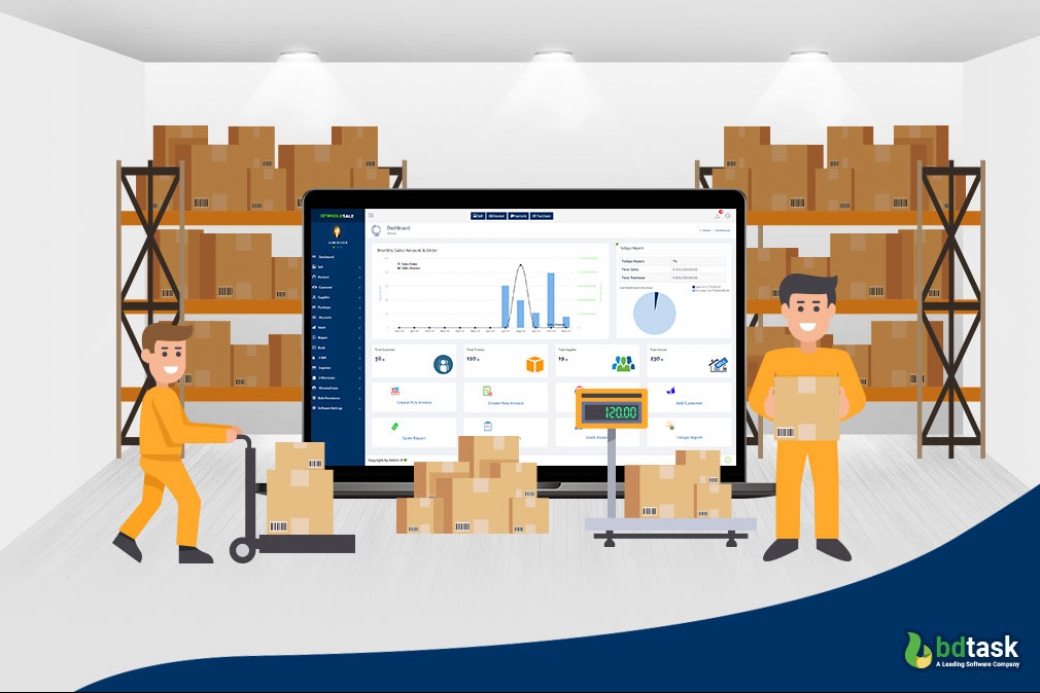Top Ways Inventory Management Software Helps Retail Businesses Perform Better

Retail businesses hold thousands of different categories of items in their inventory. Holding the optimal quantity of these items while maintaining quality is a very important task for every business. Meanwhile, recording purchases, managing return requests and returned products, and analyzing damaged and expired inventory items are part of the inventory management process. With an increase in the size of inventory, inventory management also becomes tedious and time-consuming. However, inventory management needs to be accurate, efficient, and productive, especially for retailers. To a large extent, inventory management software has helped the retail business carry out inventory management processes effortlessly and in a lesser time.
When it comes to small retail stores and businesses, inventory management can be carried out manually. But, when we talk about retail chains, multiple inventories need to be managed of considerably larger sizes. Thus a more comprehensive technique needs to be employed for inventory management of such big retail businesses. Inventory management software is the most viable option for retail chains having multiple, extensive inventories. Inventory management software enables businesses to maintain an accurate inventory with minimal effort. In this post, we will discuss some prime benefits of using inventory management software for retail businesses.
#1 Automated Inventory Management
Inventory management software's most important benefit is that it fully automates the inventory management process. It reduces manual inventory handling needs and thus reduces the requirement of the workforce. Inventory management software synchronizes all of the inventory operations and performs them more efficiently. One major problem with traditional inventory management techniques, such as manual handling, is that they are prone to error. And as the inventory gets bigger, the possibilities of error become more threatening, leading to a significant loss to the company. As automation replaces manual inventory handling needs, the chances of mistakes in recording and managing inventories decrease; thus, inventory management becomes more accurate. There are many free and open-source inventory management software available in the market that retail businesses can use for the beginning.
#2 Assists Real-time Inventory Tracking
Inventory management software allows retailers to track their inventory in real-time. Businesses can track inventory and the levels in which it is present at any time from anyplace. Using inventory tracking systems like barcode systems, RFID systems, QR code systems, etc., retailers can get real-time updates about the inventory. Inventory tracking systems constantly monitor inventory movement, whether when moving in or out of the storage. This way, retail businesses can have right and real-time stock updates, which further allows them to understand when and how much to reorder. Real-time inventory tracking helps businesses track their inventory both inside the warehouse and throughout the supply chain. Businesses can track inventory inside the supply chain by employing any mentioned inventory tracking systems like RFID systems. Moreover, these systems allow retailers to monitor inventory storage conditions while in transit over the supply chain.
#3 Demand forecasting
Whether big or small, retail businesses need to maintain the right inventory for meeting every customer demand. But most of the time, keeping the proper inventory levels becomes difficult for retail businesses due to fluctuating user demands in different parts of the year. Inventory management software solves this problem faced by most retail businesses by providing them the feature of demand forecasting. Inventory management software uses sales, seasonal trends, and other relevant data to predict future demands. This demand forecasting helps retailers identify the items the customers are most likely to buy at a particular time of the year. Thus accurate inventory levels of the right kind can be maintained to fulfill the upcoming customer demand. Additionally, demand forecasting also helps eliminate situations like overstocking, understocking, and stockouts by predicting the right amount of inventory to maintain.
#4 Accurate inventory counting
Inventory counting is an important task that every retail business, whether small or big, carries out at different frequencies. Some enterprises perform inventory counting daily, whereas some carry it out yearly or at periodic intervals throughout the year. Traditional inventory management practices include physical inventory counting, which often is prone to error, time-consuming, and less productive. In contrast, inventory management software reduces the time taken in performing inventory counting and carries it out accurately. Most inventory management softwares have this inbuilt feature of inventory counting, which furnishes the businesses with real-time information about the total inventory. Thus it is wise for retail businesses to employ inventory management software to have an accurate and real-time insight of the actual inventory present.
#5 Multichannel inventory management
Several retail chains hold both physical stores as well as online or ecommerce platforms. To fulfill these multichannel orders, it is imperative to keep sufficient inventory levels. Every item displayed on ecommerce retail platforms should be present in adequate quantities in the inventory. If a customer wishes to purchase a certain product, it should be ensured that it's made readily available to him. Inventory management software helps to keep tabs on multiple channels and ensures that adequate inventory is present all the time. If a retail business holds various stores and their respective inventories, a single inventory management software can monitor all of these stores' inventory levels. Thus inventory management software eases managing multichannel inventories from a single place through a single interface.
#6 Reduces the order fulfillment time and ensures standard product delivery
Timely deliveries and lower order fulfillment time is something that every customer looks for when purchasing items from an ecommerce store or a physical store. Moreover, having the right products delivered from the vendor at the right time is important for retail businesses too. Inventory management software keeps track of inventory as well as the lead time; the time it takes for the products to get delivered for sale. The software keeps continuous tabs on inventory levels, and once the level reaches a particular threshold value, it generates the alert for the items to be reordered.
When it comes to the consumer's side, inventory management software keeps track of inventory movement while in the supply chain. This real-time inventory tracking helps retail ecommerce businesses to ensure that the product has been shipped at the right time and reaches the consumers in minimal time. One more benefit of inventory management software is using inventory tracking systems like RFID systems; you can ensure that the products are being transferred in the right conditions. Hence the consumers get the right product of standard quality at the right time.
Wrapping up
Retail businesses are of various types and sizes. Some businesses have a single store; some hold big retail chains consisting of both physical and ecommerce stores. Depending on the business, the size, type, and a number of inventories held also varies. It's advisable for retailer businesses, no matter their size, to use inventory management software for effective and productive inventory management. Inventory management software provides retailers with several perks, some of which are mentioned in this post. A business should employ the software depending on the type of business and inventory for effective inventory management.
Would you like to read?: What Does The HR Manager Do?










